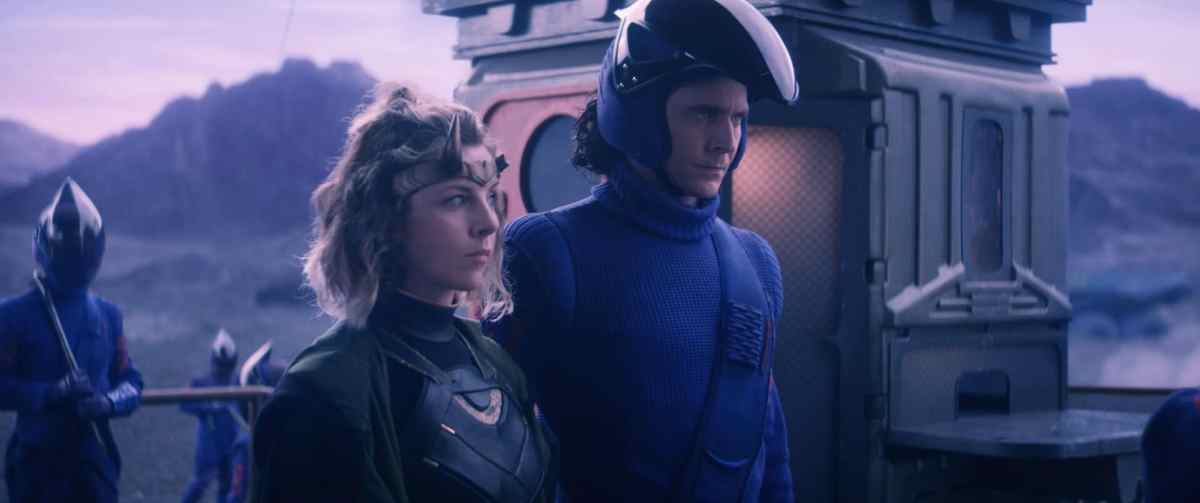As a quintessentially British television show, Doctor Who has always had an interesting relationship with American television.
Writer Terry Nation famously pitched a spin-off television show around the villainous Daleks, discussing how the American market might respond to them. The show’s 20th anniversary special, “The Five Doctors,” premiered on PBS in the United States two days before its broadcast in the United Kingdom. When the show went off the air, the first serious attempt to revive it for television was as a potential weekly series on Fox, with the pilot broadcast as a television movie in May 1996.
However, these are largely the exceptions that prove the rule. For most of its existence, Doctor Who has been treated as a curiosity on American television. Tom Baker dominated reruns on PBS, with narration provided by veteran actor Howard Da Silva. It never quite enjoyed the ubiquity of Star Trek or Star Wars. Still, the show enjoyed outsized influence for such a weird import, with The Simpsons including Tom Baker’s Fourth Doctor among “the Esteemed Representatives of Television.”
When Doctor Who was revived in 2005, the show took its time to reach the American market, arriving on the Sci-Fi Channel the following year. The show would make attempts to reach out to American audiences. Under showrunner Russell T. Davies, some filming took place in New York City with a skeleton crew for a third season two-parter. Representatives of the show were sent to San Diego Comic-Con in both 2008 and 2009.
Doctor Who wouldn’t really explode in the United States until Davies’ successor took over. Steven Moffat’s first season of Doctor Who was also the first time that the show took center stage in the vaunted Hall H at San Diego Comic-Con. The following year, the show brought its primary cast over to Monument Valley to do some location work for the season premiere. The following season’s midseason finale would take the cast and crew to Central Park.

Under Moffat, Doctor Who came to treat American audiences as part of the fandom. Starting with Moffat’s second season, Doctor Who was broadcast on the same day in both the United States and the United Kingdom. The series repeatedly broke viewership records for BBC America. The show’s 50th anniversary special was broadcast simultaneously around the world, setting a record for the largest ever dramatic simulcast.
Still, Doctor Who’s influence on American television remained somewhat marginal. It would serve as one of the touchstones for Rick and Morty, along with more obvious sources like Back to the Future or comic books. In promoting the launch of Rick and Morty, Dan Harmon conceded that there is “a heavy dose of Doctor Who in there.” It would receive shoutouts on Community. Christopher Eccleston even cameoed on The Sarah Silverman Show in homage to his Doctor Who tenure.
On some level, it is not a surprise that Loki owes so much to Doctor Who. Both are shows about time travel, so some thematic and narrative overlap is expected. Showrunner Michael Waldron also worked on Rick and Morty and acknowledges that his work on Loki owes a debt to that. Still, it’s not that any single idea in Loki can be traced back to Doctor Who; it’s that so much of Loki seems to be drawn from the same ideas. At one point, Loki is even described as “that criminal with the blue box.”
The show’s premiere finds Loki (Tom Hiddleston) plucked out of time and placed on trial for crimes against the timeline, before being thrown into conflict with an alternate version of himself. This is the basic plot of the original Doctor Who’s season-long “Trial of a Time-Lord.” The show’s second episode hinges on Loki discovering that natural disasters like Pompeii are great cover for time-traveling con artists, a technique favored by Doctor Who companion Captain Jack Harkness (John Barrowman).

These influences become particularly pronounced in the third episode. The planet Lamentis-1 feels like a much higher-budget riff on classic Doctor Who stories. The purple surface looks like a higher-quality version of Thoros Beta from “Mindwarp.” The equipment and landscape make it clear that Loki has landed in the middle of an actual alien quarry, as if a joke about how most planets on Doctor Who were really just quarries.
Loki draws heavily from the work of showrunner Steven Moffat. This makes sense, as Moffat is the show’s most “timey-wimey” writer. The TVA is a bureaucracy that exists outside of space and time, obsessed with forms and procedures, recalling the presentation of the afterlife in “Dark Water.” The moon exploding and raining destruction down on the world below in the third episode evokes the stakes of “Kill the Moon.” The futuristic-but-also-retro train recalls “Mummy on the Orient Express.”
Crucially, the premise of the third episode of Loki involves two versions of the same character in conversation with one another, with Loki confronting the variant Sylvie (Sophia Di Martino). This is a classic Doctor Who trope, given that the concept of the show involves the character changing their face and personality once every few years. Anniversary episodes often feature different actors returning to the show to play off one another.
Still, the dynamic between Loki and Sylvie feels more particular to Moffat’s version of Doctor Who. Loki is a villainous character who finds himself confronted with a gender-swapped alternate version of himself who has chosen another path in life. This was one of the central premises of Moffat’s final season finale of Doctor Who, in which the villainous Master (John Simm) found himself at odds with a female version of himself known as Missy (Michelle Gomez).

The Doctor Who sensibility within Loki exists as part of a broader sampling of British science fiction. Loki features several prominent British cast members, including Tom Hiddleston, Gugu Mbatha-Raw, Wunmi Mosaku, Sophia Di Martino, and Richard E. Grant. Director Kate Herron has acknowledged Terry Gilliam’s Brazil as a direct inspiration on the brutalist aesthetic of the TVA, and the show’s design also recalls Stanley Kubrick’s A Clockwork Orange or Ben Wheatley’s High-Rise.
Loki is unlikely to be as truly anarchic as Doctor Who. Andy Welch argued that Loki is what Doctor Who might be like “if it had a bigger budget,” but this misses the fact that the cheeky and playful aesthetic of Doctor Who is a large part of its appeal. Some Doctor Who fans lament that the series never became an expansive shared universe with countless spin-offs and tie-ins like Star Trek or Star Wars, but this overlooks the nimbleness and freedom that comes with the show’s quaintness.
Doctor Who essentially reboots itself with every episode, dropping its characters into new genres and new stories. The show has aggressively rejected the idea of continuity and embraced the art of “not giving a toss how it all fits together,” while Loki feels transgressive for just suggesting that there might be some value outside the canon. It is revealing that so many of the references to Doctor Who feel like sideshows in the larger arc of Loki. By its nature, Loki could never be as punk or irreverent.
Of course, there is an argument that the modern incarnation of Doctor Who has sacrificed some of its identity to look more like generic American television. Moffat’s successor Chris Chibnall invested in anamorphic lenses to make the show look more “cinematic,” shifting to a consciously stylized 18:9 aspect ratio to keep pace with “Netflix, Amazon and Hulu.” Chibnall has also pushed away from the bombastic soundtrack of Murray Gold to Segun Akinola’s more minimalist style.

Under Chibnall, the show has also engaged in continuity fetishism, with its most recent season finale built around an “everything you know is wrong” revelation about the show’s history that calls back to a visual reference from January 1976. While some fans insist that these revelations break the continuity of the show, they are more notable for imposing the sort of rigid continuity and backstory that Doctor Who had long avoided, but which franchises like Star Wars love.
As such, it’s nice to see Loki embrace some of the charm that the modern incarnation of Doctor Who has abandoned. Loki is built around many of the same metaphors and themes as Steven Moffat’s Doctor Who, especially concerning identity and self. Behind all the time travel and alternate universe mechanics, both Moffat’s Doctor Who and Loki are about a person’s right to determine their own story and to decide who they are. The Doctor chose his name as “a promise.” Sylvie rejects the name “Loki.”
Moffat’s Doctor Who used the process of recasting as a metaphor for personal growth. In his final moments, the Eleventh Doctor (Matt Smith) explains, “We all change, when you think about it. We’re all different people all through our lives.” Moffat’s Doctor Who and Loki explore this theme metatextually, understanding these characters through the roles they play in stories; the Eleventh Doctor reads spoilers in books published by his companions while Loki binge-watches the MCU.
Doctor Who is an odd and eccentric show. Loki will never tap into that same distinctive weirdness. However, there’s something interesting in seeing the show offer a more populist and more mainstream riff on some of the same basic ideas, demonstrating that the show’s core themes are truly timeless.






Published: Jun 26, 2021 12:00 pm